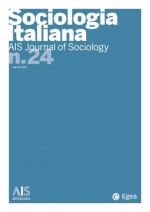Ricerca
Filtri applicati:
Raffina la ricerca
- Parola chiave
- emozioni (9)
- Emozioni (3)
- algoritmi (3)
- mutamento sociale (3)
- professioni (3)
- Emotions (2)
- biocapitale (2)
- competenze (2)
- Macroarea
- Sociologia (146)
- Lingua
- Italiano (46)
- Inglese (22)

Writing Ethnographies: The Role of Narrative
The subject of this paper is the importance of certain narrative elements to ethnographic writing and especially to reporting qualitative research based on observation (both participant and otherwise) and interviews (Czarniawska, 2004). I should point out that the following considerations are essentially methodological and theoretical. A further, more practical, text will follow in the near future. ...

Experts and science communication in time of Covid vaccination campaign: the Italian case
1 The communication of science during the pandemic Throughout the pandemic, the speed with which science has operated within the uncertainties of COVID-19 has aligned and adapted with the increased need for public information, consequently identifying itself as a challenge also for information systems invited to respond quickly to the new demands imposed by the crisis (Thomas and Senkpeni, 2020). ...

Changes in Schooling: The impact of Digitalization on PTSOs (Work Experience Programs). From Planning to Implementation
1 Work Experience Programs and digital competencies: a general framework Law n. 145 from December 30, 2018, article 1, comma 785, states that the Ministry of Education, University and Research is bound to publish the guidelines for Work Experience Programs (PTSOs – Paths for transversal competencies and orientation) (see MIUR, 2018), which have taken the place of so-called School-Work Alternance ...

The sociology of emotions as a suitable perspective to explore poverty in accordance with the capabilities approach
Introduction The article presents the first insights of an explorative research aimed at analyzing poverty from the perspective of the sociology of emotions. It hypothesizes that emotions can represent a useful instrument to combat poverty at an individual and social level. Most recent policies and measures against poverty at national and international level have adopted as reference the paradigm ...

From Risk to Emergencies: Changes in Cultural and Communication Systems in the Digital Society
1 Risk, crisis and emergencies: cultural dynamics and changes A world without risk situations and events, crises and emergencies – regardless of their differentiated nature (social, economic, political and environmental) – is not conceivable, let alone possible. One can imagine, however, a world in which the effects and negative consequences of these conditions are reduced or even avoided. The ...

«By Any Means Necessary»: Three Generations of the No TAV Movement in the Era of the Digital Turn
This study explores the digital expressions of the No TAV movement in Valsusa, focusing on how activists use culture for strategic impact. The whole research employs mixed and digital methods. This paper is focused on the integrated research phase held by interviews and observations on-site, as follow up of a previous phase related on the online framing analysis. It investigates how online frames ...

Sociodigital Futures? An agenda for sociological research and practice
Digital technologies, devices and data are woven into the fabric of contemporary societies: the digital and the social are co-evolving in a «sociodigital» world. This raises significant and pressing questions about sociodigital futures: how these are made and what might be done to intervene in them. Sociology is well-placed and – at the same time – faces significant challenges in addressing ...

Le reazioni delle reti interorganizzative sociosanitarie agli eventi catastrofici. Il caso del terremoto del 2016 nelle Marche
Questo studio è finalizzato all’analisi dell’evoluzione della struttura della rete interorganizzativa che lega i centri che si occupano di erogare servizi socio-assistenziali nell’ambito della salute mentale nella provincia di Ascoli Piceno, in conseguenza al sisma del 2016. L’analisi è stata realizzata utilizzando la Social Network Analysis, basata su dati provenienti sia da database che ...

Social media e giornalismo: dall’ibridazione alla polarizzazione della sfera pubblica contemporanea
Il contributo tratta il tema della crisi del giornalismo, chiamato a confrontarsi con la frammentazione ingenerata dall’ingresso dei social media nella sfera pubblica. Mira a fornire un quadro teorico interpretativo originale che, partendo da riferimenti fondamentali e classici della teoria sociologica per individuare il perimetro dello stesso concetto di sfera pubblica, proponga l’ipotesi della ...

Liberi di amare? Uno studio esplorativo sull’habitus emotivo
Lo studio dell’amore e delle emozioni non è solo una questione privata o psicologica, esso rivela le tensioni e le diseguaglianze sociali ed economiche della vita quotidiana nella post-modernità. Sebbene l’amore post-moderno pare sia caratterizzato da grandi forme di libertà, in questo articolo sostengo che l’innamoramento permetta di aprire uno spazio di liminalità e sperimentazione, ma ...